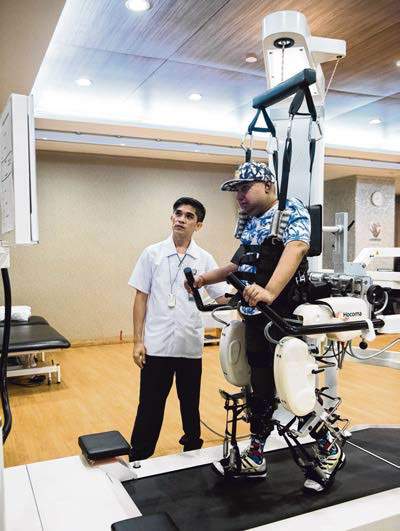Staff being trained to take on more duties to ease load of physio and occupation therapists
The Straits Times (30 May 2018) - There is a move to get support staff to physiotherapists or occupation therapists to take on more skilled duties, in much the same way nurses are trained to perform some roles done by doctors.
Take Tan Tock Seng Hospital (TTSH), where more therapy support staff now perform tasks previously handled by only occupational therapists or physiotherapists after job roles were expanded three years ago.

Mr Arvic Penaranda Mandawe, a therapy support associate at TTSH, helping patient Manimaran Manikam with gait training.
ST PHOTO: LEE JIA WEN
This has freed up therapists to focus on complex cases, such as patients with a higher level of physical dependency or cognitive problems. TTSH studies also found that sessions run by therapy support staff are as effective as those by occupational therapists or physiotherapists.
Two of the studies showed that patients had comparable improvements in walking speed, endurance, balance and ability to perform activities of daily living.
So far, 23 of the 48 therapy support staff at TTSH have completed two months of theoretical and practical training, followed by a competency assessment. They can now conduct exercise classes and occupational therapy for patients, as well as help them integrate back into the community.
“Job redesign creates an opportunity for our therapy support staff to learn and grow within the department,” said Ms Doreen Yeo, chairman for TTSH’s Allied Health Services and Pharmacy. “Therapists now have more time to tend to more complex patient cases .”
Mr Arvic Penaranda Mandawe, 40, a therapy support associate at TTSH, has been taking on additional duties since August 2016.
Besides the standard training, he has learnt skills in robot-assisted rehabilitation, treadmill and circuit training programmes.
“I feel empowered to do more things for patients,” said Mr Arvic, who has been at TTSH for five years. “Having the chance to see the patient independently is really a big thing for me,” he said.
In the past, he could carry out only individual treatments, and assisted or led group therapies under the direction of a therapist.
Mr Arvic’s expanded role allows him to provide therapy to patients like Mr Manimaran Manikam, 38, who suffered a brain injury in a hitand- run accident 10 years ago.
TTSH is also working with the Institute of Technical Education to develop a new work-learn technical diploma programme to train higher skilled therapy assistants.
The National University Hospital has also expanded its therapy assistant roles since 2016. For example, therapy assistants in its neurological rehabilitation outpatient service are trained to set up and monitor patients on Armeospring, an upper limb rehabilitation device.
SingHealth also plans to beef up the skills of therapy assistants. Its College of Allied Health will offer a part-time training programme for 18 of 80 physiotherapy therapy assistants from next year.
This will enable them to provide therapy for patients, such as those who have undergone total knee replacement and do not have post-operative complications, said Professor Celia Tan, SingHealth’s group director of Allied Health.